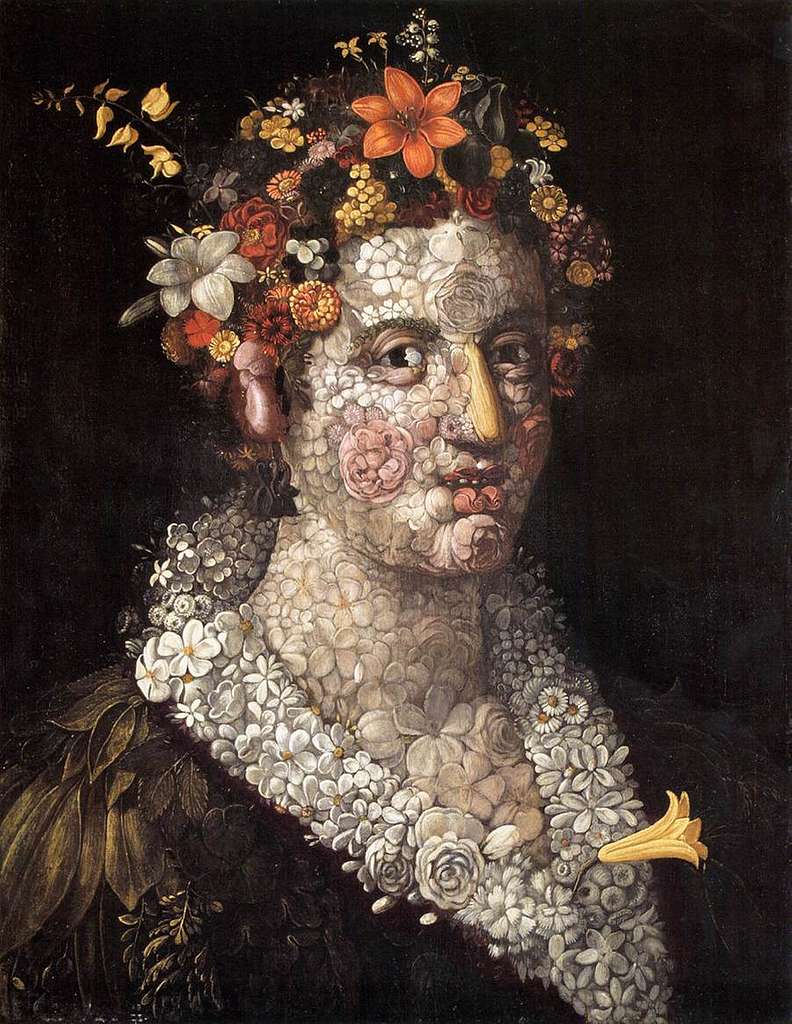The White Witch
By James Weldon Johnson
Annotations by Rene Marzuk

O brothers mine, take care, take care![1] The great white witch rides out tonight, Trust not your prowess nor your strength; Your only safety lies in flight; For in her glance there is a snare, And in her smile there is a blight. The great white witch you have not seen? Then, younger brothers mine, forsooth, Like nursery children you have looked For ancient hag and snaggled tooth; But no, not so; the witch appears In all the glowing charms of youth. Her lips are like carnations red, Her face like new-born lilies fair, Her eyes like ocean waters blue, She moves with subtle grace and air, And all about her head there floats The golden glory of her hair. But though she always thus appears In form of youth and mood of mirth, Unnumbered centuries are hers, The infant planets saw her birth; The child of throbbing Life is she, Twin sisters to the greedy earth. And back behind those smiling lips, And down within those laughing eyes, And underneath the soft caress Of hand and voice and purring sighs, The shadow of the panther lurks, The spirit of the vampire lies. For I have seen the great white witch, And she has led me to her lair, And I have kissed her red, red lips, And cruel face as white and fair; Around me she has twined her arms, And bound me with her yellow hair. I felt those red lips burn and sear My body like a living coal; Obeyed the power of those eyes As the needle trembles to the pole; And did not care, although I felt The strength go ebbing from my soul. Oh! she has seen your strong young limbs, And heard your laughter loud and gay, And in your voices she has caught The echo of a far-off day, When man was closer to the earth; And she has marked you for her prey. She feels the old Antaean strength [2] In you, the great dynamic beat Of primal passions, and she sees In you the last besieged retreat Of love relentless, lusty, fierce, Love pain-ecstatic, cruel, sweet. O brothers mine, take care, take care! The great white witch rides out tonight! O younger brothers mine, beware! Look not upon her beauty's snare, For in her glance there is a snare, And in her smile there is a blight.
JOHNSON, JAMES WELDON. “THE WHITE WITCH,” IN THE DUNBAR SPEAKER AND ENTERTAINER, ED. ALICE MOORE DUNBAR-NELSON, 85-87. NAPERVILLE, ILL: J. L. NICHOLS & CO., 1920.
[1] In The “White Other” in American Intermarriage Stories, 1945-2008), Lauren S. Cardon writes that Johnson was once almost lynched for appearing in the company of a white woman in Jacksonville. A Johnson’s profile from The Jaxson, a cultural an urban multimedia project, references the same episode.
[2] In Greek Mythology, Antaeus was a powerful giant who drew his strength from direct physical contact with the earth. He was slain by Hercules.
Contexts
“The White Witch” was initially published in 1914 in The Crisis, the official magazine of the National Association for the Advancement of Colored People (NAACP). The poem also appeared in The Dunbar Speaker and Entertainer (1920), edited by Alice Moore Dunbar Nelson. The book’s dedication reads: “To the children of the race which is herein celebrated, this book is dedicated, that they may read and learn about their own people.”
In the foreword to The Dunbar Speaker, Leslie Pinckney Hill, African American educator, writer, and community leader who graduated from Harvard University in 1903, criticizes the one-sidedness of prevailing reading courses: “In vain may you search their pages—those pages upon which all our reading has been founded—for anything other than a patronizing view of that vast, brooding world of colored folk—yellow, black and brown—which comprises by far the largest portion of the human family.” Assessing the importance of Alice Dunbar-Nelson’s book, he writes that it seeks to prove “that the white man has no fine quality, either by heart or mind, which is not shared by his black brother.”
Think of reading this poem out loud. Elocution (or public speaking) was a highly valued and widely taught skill in nineteenth-century America. In her introduction to the Dunbar Speaker, Alice Dunbar-Nelson offers some advice: “Before you begin to learn anything to recite, first read it over and find out if it fires you with enthusiasm. If it does, make it a part of yourself, put yourself in the place of the speaker whose words you are memorizing, get on fire with the thought, the sentiment, the emotion-then throw yourself into it in your endeavor to make others feel as you feel, see as you see, understand what you understand. Lose yourself, free yourself from physical consciousness, forget that those in front of you are a part of an audience, think of them as some persons whom you must make understand what is thrilling you–and you will be a great speaker.”
Definitions from Oxford English Dictionary:
forsooth: In truth, truly.
snaggled: Of teeth: Uneven, irregular, projecting.
Resources for Further Study
- Lauren S. Cardon dedicates a chapter from her book In The “White Other” in American Intermarriage Stories, 1945-2008, to unpack the figure of the “white witch” in African American literature. She credits Ida B. Wells-Barnett’s with the first thorough documentation of the archetype in her 1892 pamphlet Southern Horrors: Lynch Law in All Its Phases. “During the twentieth century,” Cardon writes, “ white women surfaced as harbingers of doom in literature written by black authors.”
- Lynching in America is an interactive website structured around Equal Justice Initiative (EJI)’s comprehensive report Lynching in America: Confronting the Legacy of Racial Terror.
- In 1955, 14-year-old Emmett Till was lynched in Mississippi after being accused of flirting with a white woman. His murder was a catalyst for the emerging U.S. civil rights movement.